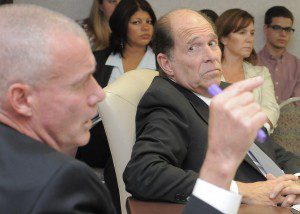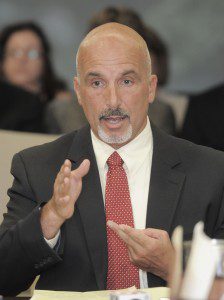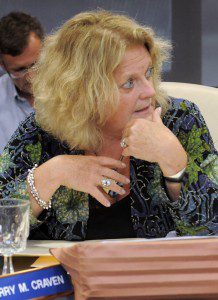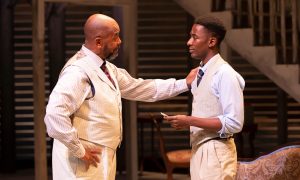
John F. Flynn III, chairman of Trustees for Westfield State University, foreground, responds to a question as Westfield State University President Evan Dobelle, background, looks on. The Board of Trustees met last night to review expenses incurred by Dobelle. (Photo by Frederick Gore)
WESTFIELD – A review of credit card and travel policies and practices at Westfield State University released by the university trustees after their meeting last night detailed dozens of infractions by university president Evan Dobelle and his staff but in large part he declined to respond to those charges and instead offered an impressive list of accomplishments achieved in his five year tenure in Westfield.
The trustees did not take him to task for his free spending ways but instead heaped praise on him for his successes.
O’Connor and Drew, a Braintree accounting firm which regularly audits the WSU books, and the books of dozens of other similar institutions, was engaged to review how Dobelle and administration staffers adhere to the university’s policies governing use of credit cards provided by the university – and the WSU Foundation – to pay for university expenses. The company was also tasked to examine how those officials adhered to travel policies.
The resulting review detailed dozens of infractions by Dobelle and his staff but found that no monies had been misappropriated.
The WSU policies prohibit use for personal expenses of the credit cards issued but the review showed that university and foundation credit cards had been used to pay for expenses incurred by Dobelle’s family members, as well as personal expenditures.
Although the review found that the university and the foundation were reimbursed for all Dobelle’s personal expenses, sometimes more promptly than others, the report points out repeatedly that, by policy, none should have occurred.
Dobelle pointed out that most of the transactions examined are “historical” and that the policies have already been changed and tightened.

David A. Diiulis, principal of O’Connor & Drew P.C., a certified public accounting firm in Braintree, explains the results of an analysis of spending expenses by Westfield State University President Evan Dobelle during a meeting with Trustees of the university last night. (Photo by Frederick Gore)
He has maintained that he simply used the wrong credit card to pay for some of the expenses and said last night that “I followed the practice of having my credit card bills reviewed for any personal charges and repaying them immediately. In retrospect, I wish that I had given the process more personal attention. “
O’Connor and Drew point out that, had there not been personal charges to find, university staff would have not had to spend time sorting personal expenditures from the university expenses.
The reviews also discovered violations of existing travel policies in Dobelle’s records.
They detail many instances in which travel costs were higher because the trips were booked shortly before the travel dates resulting in high fares.
In addition, many changes were made to travel plans which caused the travel costs to soar.
The review also found conflicts in the travel records in terms of charges which were declared personal but were incurred while Dobelle had not taken personal time.
The reviews list dozens of charges for legitimate expenses which were more than “necessary and reasonable.”
Dobelle offered explanations for some of the expense of some of the foreign accommodations – such as security concerns and the need to be seen as substantial by foreign officials who might not take seriously a visitor staying at cut-rate hotels – but he made no attempt to justify what many view as exorbitant costs for meals, lodging and entertainment expenses closer to home beyond pointing out that the review does not specify the number of persons involved in the listed expenses.
He previously has said that when entertaining potential donors he has authorized expensive meals and entertainment but maintains that the return in terms of donations justified the expenses.
Dobelle did not address specific charges but instead spoke of the return on investment resulting from his actions.
He complained that the accounting firm made no effort to determine what the common practices are and the firm was not clear about the goals of the foundation or his strategic vision for the university.
“A deeper understanding of our university’s goals and recent achievements could have gone a long way toward providing the accountants with the perspective necessary to appreciate the significant return on investment garnered from these expenditures,” he wrote in a letter to the trustees.
Dobelle also complained that the accountants declined his repeated requests to meet with himself and his staff.
David A. Diiulis, representing O’Connor and Drew, was asked by trustee Luis G. Perez, “Why didn’t you see fit to include Dr. Dobelle as part of the process?” and was told that Dobelle had an opportunity to provide a written statement but declined.

Westfield State University Trustee Terry M. Craven questions the legality of an offsite meeting with Westfield State University President Evan Dobelle and certain members of the Board of Trustees during a meeting last night at the university. (Photo by Frederick Gore)
Diiulis said that, without such a statement, the review process did not include knowledge of special conditions at the university.
Despite the violations enumerated, the trustees of the university spoke highly of Dobelle and his accomplishments.
Dobelle noted significant changes in the school under his leadership.
The university now offers, he said, a new master’s degree in social work, a bachelor’s program in nursing and new departments of World Language and Ethnic and Gender Studies.
He said that during his five-year tenure there has been a 30 percent increase in tenure track professors and the school has seen a vast increase in international study opportunities for students.
He said that he has increased grants to students and has transformed the campus.
Dobelle pointed out, WSU has been ranked “Number 1 by Mass Inc, as the best value for graduation of all state private and public colleges and universities.” Dobelle noted that Harvard was ranked second, behind WSU.
Perez said that public perception of extravagant spending is an issue but said that Dobelle’s achievements are praiseworthy.
He said that he was impressed by the school’s new residential building, which he referred to as “a Taj Mahal”, but said that the WSU students deserve the new building which Dobelle pointed out is being paid for, principal and interest, by the students living there.
“This is money well spent,” Perez said but added “Things did happen, things should not happen and you move on.”
Trustee Steven P. Marcus told Dobelle “you acted like a CEO” but said “what you just shared (the achievements of his administration) should have been shared weeks, months ago.”
Dobelle said that all the information offered to the trustees had been available to the media and the trustees roundly criticized press reports that focused on Dobelle’s spending and did not devote sufficient attention to the accomplishments which resulted from his leadership.
John F. Flynn III, the chair of the trustees, said “this president has done more in five years than anybody has done in 30 years,” but also said “What bothers me is we’ve got policy violations.”
He said in government “there’s a different standard and we’ve got to know that. There’s some responsibility here to clean this up. It doesn’t detract from the all good things that we’ve noticed and that we’ve put on the record but it doesn’t excuse it, in my opinion.”
In the end, the trustees unanimously voted to accept the report by the accounting firm but also ensured that Dobelle’s message would be released with that report.
Trustee Joseph Carvalho III earnestly introduced a motion to accept the president’s report and release it along with accountants’ review.
The discussion preceding a unanimous vote to approve the motion was dominated by trustees speaking in favor of distributing Dobelle’s response to the review.
A motion offered by Flynn to postpone any action on the credit card policy violations and the time and attendance discrepancies detailed in the review until the October meeting of the trustees, to allow time for investigations underway by the office of the inspector general and other bodies, also passed unanimously.
Another motion by Flynn, to establish a moratorium on air travel by the president and vice presidents, failed after a second was withdrawn when several trustees argued that the control already in place, review of the president’s travel plans by the chair of the trustees, is sufficient.





